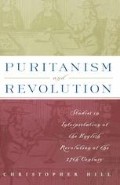Abstract
In 1913 R. G. Usher wrote: ‘The English Revolution of 1640 is as much an enigma today as it was to Charles. It is a riddle which has to be solved. No one has tried to solve it because all assumed it was solved by repeating the Great Remonstrance. Every Englishman born since 1800 has … been born into a view of English history.’1
The adherents of the king were chiefly composed of the nobility and higher gentry, men who, by their wealth and station, had much to lose; and who, in the annihilation of monarchy, and in the anarchy that was likely to follow, foresaw the ruin of their fortunes, and the extinction of their consideration and influence. The middling and inferior gentry, together with the inhabitants of towns; those who entertained a jealousy of the nobles, and of the king, or who, by the changes in the state of society, had lately been raised to independence, became, on the other hand, the great supporters of parliament.
John Millar, An Historical View of the English Government, III (published posthumously, in 1803), p. 295.
Access this chapter
Tax calculation will be finalised at checkout
Purchases are for personal use only
Preview
Unable to display preview. Download preview PDF.
Notes
J. and T. W. Webb, Memorials of the Civil War in Herefordshire (1879), II, pp. 349–53. The whole of Kirle’s letter of 6 March 1643 is interesting.
Notes
Ed. G. Parsloe, The Minute Book of the Bedford Corporation, 1647–64 (Publications of the Bedfordshire Historical Record Society, XXVI, 1949); W. H. Summers, ‘Some Documents in the State Papers relating to High Wycombe’, in Records of Bucks., VII (1895), pp. 512–27.
Notes
Ed. E. Kerridge, Surveys of the Manors of Philip, First Earl of Pembroke and Montgomery, 1631–2 (Wilts. Archaeological and Natural History Society, Records Branch, Vol. IX, 1953); ed. M. E. James, Estate Accounts of the Earls of Northumberland, 1562–1637 (Surtees Society, Vol. CLXII, 1955).
Copyright information
© 1997 Christopher Hill
About this chapter
Cite this chapter
Hill, C. (1997). Recent Interpretations of the Civil War. In: Puritanism and Revolution. Palgrave Macmillan, New York. https://doi.org/10.1007/978-1-349-61668-8_1
Download citation
DOI: https://doi.org/10.1007/978-1-349-61668-8_1
Publisher Name: Palgrave Macmillan, New York
Print ISBN: 978-0-312-17434-7
Online ISBN: 978-1-349-61668-8
eBook Packages: Palgrave History CollectionHistory (R0)

